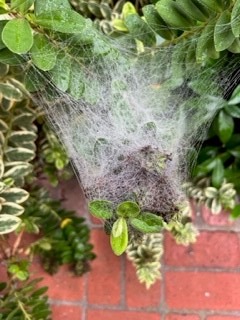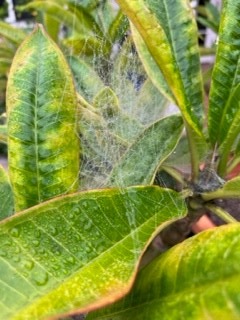GARDEN SURROUNDINGS: Are spider mites taking over the world?
- k-england
- Oct 31, 2022
- 3 min read
Updated: Dec 1, 2022
By Francesca Filanc, for Let's Talk Plants! November 2022.

Are Spider Mites Taking Over The World?
The other night as I was putting my dog out to do his business, I screamed because I ran right into an Orb-weaver spider web. It’s okay though because these are very large beneficial spiders in the garden. However, this morning I found plants in my garden suffocating from spider mites, a fast-growing stealth predator of an insect.
Climate change is causing increased challenges for healthy plants in our gardens. Plants are dying or not doing well because of insects that are not dying but taking on a tighter hold and killing and/or making plants and trees sick.

I just spent the last hour running around the garden in my nightie, (pajama gardening is a thing! Who knew?) with a broom and clippers. Prince, my steadfast friend and companion, an intelligent Standard Poodle who even watches TV, watches my every move and was in hot pursuit, right at my side while I ran hither and yon in my bare feet, wanting to help me conquer the enemy. Needless to say, Prince is now happily sprawled out fast asleep on the carpet from exhaustion as I type furiously on the computer.
Prince, as intelligent as he is, barely lifted his head while I wrote to say, “Breakfast time yet mom?”
Suddenly guilt stricken, I tore myself away from the keyboard to feed him his breakfast all while still in my nightie and bare feet.
As an organic gardener myself, I am not using pesticides. If you are like me then try the following:
Use Rubbing Alcohol.
Kill spider mites by combining a mixture of 1 cup of rubbing alcohol and 4 cups of water, then spray the solution on your plants. Cover the stems, flowers, and foliage thoroughly. Rubbing alcohol kills spider mites by dehydrating them.
Release predatory mites.
The purchase and release of predatory mites can be useful in establishing populations in large plantings or orchards, but the best results are obtained by creating favorable conditions for naturally occurring predators, such as avoiding dusty conditions and insecticide sprays. The major predator mites commercially available for release are the western predatory mites and Phytoseiulus. The western predatory mite is more effective under hot, dry conditions. These predators don’t feed on foliage or become pests; thus, if pest mites aren’t available when predatory mites are released, the predators starve or migrate elsewhere.
If you wish to establish predators in a heavily infested orchard or garden that has few predators, use a soap spray or selective miticide to bring pest mites to a lower level and then release predatory mites. A good guideline is that one predator is needed for every ten spider mites to provide control. More than one application of predatory mites may be required if you want to reduce pest populations rapidly. Concentrate releases in hot spots where spider mite numbers are highest. Once established on perennials, predatory mites may reproduce and provide biological control indefinitely without further augmentation unless nonselective insecticides are applied that kill the predators.’
‘Tip Top Bio’ sells predatory mites online. Or Armstrong’s Nursery in Del Mar can special order them.

It’s a beautiful fall day in San Diego and sunshine is streaming in through the open window. As frustrating as pests are in the garden it is important to take the time to breathe deeply and sit and smell the roses - literally. My heart just welled up with joy. As I write this article a frog is crocking out in the garden. Prince is happily dreaming… Maybe he is seeing how he can help me destroy more spider mites in the garden.
Happy Gardening,
~ Francesca







